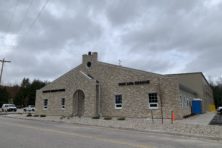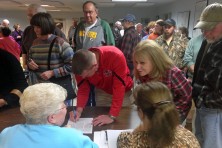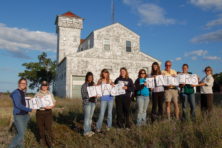Ag Station In Budget Crosshairs
- Share
- Tweet
- Pin
- Share
After nearly 90 years in Door County, an agricultural resource faces crippling budget reductions, which could impact local fruit growers, as well as the employees working to help them.
The Peninsular Agricultural Research Station faces up to $125,000 in cuts to its $260,000 budget. Closure is also on the table.
Both choices are still just proposals, station Superintendent Dick Weidman said, but with the University of Wisconsin – Madison’s College of Agriculture and Life Sciences (CALS) facing a $3.1 million budget reduction, the research stations funded by CALS will see cuts.
Under Gov. Scott Walker’s budget, UW – Madison faces $125 million in budget reductions for the next biennium. CALS is proposing that the Agricultural Research Station Department shoulder $800,000 in funding cuts.
The Peninsular Agricultural Research Station is one of 12 throughout the state, but is the only one that studies specialty crops such as apples, cherries and grapes.
Tourists spend nearly $5 million on fruit and fruit products in Door County each year, Door County Agricultural Agent Dean Volenburg said.
Because of its unique position studying specialty crops and its location, Weidman feels CALS delegated the station an unfair share of the burden.
Other stations are taking less significant cuts, Weidman said, adding, “We feel somewhat singled-out as a target.”
Bill Tracy, CALS interim dean, said the stations are meant for research, and the small staff at the Peninsular station conducts less research than others, which is a main reason for the reductions. CALS is not considering equal funding reductions either.
“We cannot do across the board cuts because that’s not a way to build your strengths…eventually you’ll have nothing left,” Tracy said.
The Wisconsin Idea in action
Sitting on 120 acres just north of Sturgeon Bay along Highway 42, UW – Madison purchased the former dairy farm in 1922.
Volenberg said the research station is one example of the Wisconsin Idea, the belief that what students learn, what researchers study and what faculty members teach should extend beyond campus to the citizens of Wisconsin.
It’s meant to be an ideal for all Wisconsinites, not just those who attend UW – Madison.
Various test plots occupy the land, as well as the United States Potato Genebank, which is operated in conjunction with the United States Department of Agriculture.
Researchers at the station are studying, for example, apple plantings in Honeycrisp apple trees.
The trees are planted inches apart, pruned to have few outstretching limbs and stabilized with wire. Following the station’s method, growers could plant 1,800 trees per acre, as opposed to older methods of planting which allow for only 100 trees per acre, researcher Matt Stasiak said.
They also study cherries, blueberries, grapes and other crops.
The station’s experiments provide a direct benefit to local fruit growers, who contact the station with questions about pest management and weather conditions, among other things.
Since it blossomed post-World War II, grower outreach has been a station priority. Back then, three full-time faculty members from CALS worked at the station: an entomologist who studied insect populations; a plant pathologist who studied diseases among the fruit trees; and a horticulturist.
Over time, funding limitations pulled faculty members back to Madison, Weidman said, with the number of Madison researchers who utilize the station dropping from six to two.
“The limited staff on campus that deal with fruit crops…has been diminished over the years,” he said. “That puts more responsibility on us to pick up some of the pieces that have been taken out of the picture.”
The employees understand UW – Madison’s push for research. Stasiak described the relationship between research and outreach as a balancing act. To counter the shrinking numbers of researchers over the years, the Peninsular station has increased their communication with local growers to see what types of experiments and information they would benefit from most.
Conversely, Tracy said the stations should not pursue outreach.
“The stations are not meant for helping the local growers and farmers – they’re meant for research,” he said. “The locals can go to their county [UW] Extension offices and talk with their extension agent if they have questions.”
An uncertain future
Tracy said all 12 research stations are safe from closure in 2011. Before decisions are made CALS will consult station employees and community members to gauge the impact of budget reductions or station closures.
But those employed at the Peninsular station are not waiting for the axe to fall. Together with a group of local fruit growers, the researchers are working to prevent the massive cuts.
Steve Wood, who owns Wood Orchards in Sturgeon Bay, Wisconsin Red Cherry Growers President Terry Sorenson, and Bill Schmiling, the former owner of von Stiehl Winery in Algoma, all voiced their support for the station at a recent media day.
“The fruit growers are stakeholders, and if we don’t say it’s important to our industry, no one else will,” Wood said.
As universal as budget reductions are today, the proposed cuts could signal larger problems for the state’s flagship university, including calling into question one of its most beloved and touted principles – the Wisconsin Idea.
“We hope this doesn’t mean that the borders of the university stop at the beltline in Dane County, but that they actually do reach the corners of the state of Wisconsin,” Weidman said.




